Analysis of Pipeline Vandalization in the Niger Delta of Nigeria
VerifiedAdded on 2021/04/17
|21
|8726
|178
Report
AI Summary
This research paper investigates the issue of pipeline vandalization in the Niger Delta region of Nigeria. It explores the causes, including the impact of oil extraction on local communities, corruption, and socio-economic factors. The paper examines the role of the government, international agencies, and the impact on the environment and local populations. The research methodology involves data collection and literature review to analyze the situation. The paper also discusses the historical backdrop of vandalization, the role of legislation, and conditions leading to the issue. It addresses research questions such as the causes of vandalization, the role of government, and potential solutions. The paper concludes with a discussion of the findings and offers recommendations for reducing pipeline vandalism, addressing its negative impacts, and promoting sustainable development in the region. The references cited provide a comprehensive overview of the existing literature on the topic.
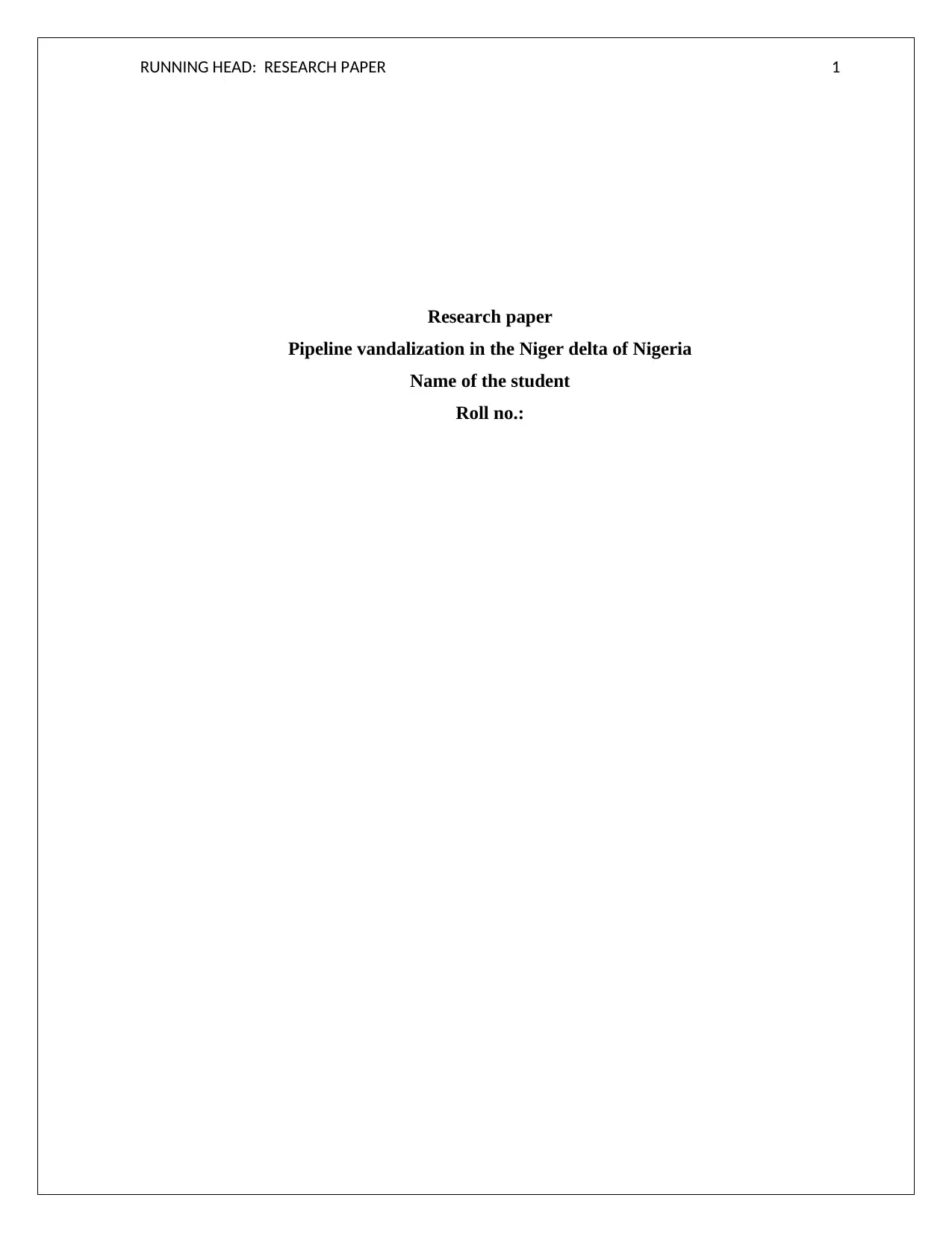
RUNNING HEAD: RESEARCH PAPER 1
Research paper
Pipeline vandalization in the Niger delta of Nigeria
Name of the student
Roll no.:
Research paper
Pipeline vandalization in the Niger delta of Nigeria
Name of the student
Roll no.:
Paraphrase This Document
Need a fresh take? Get an instant paraphrase of this document with our AI Paraphraser
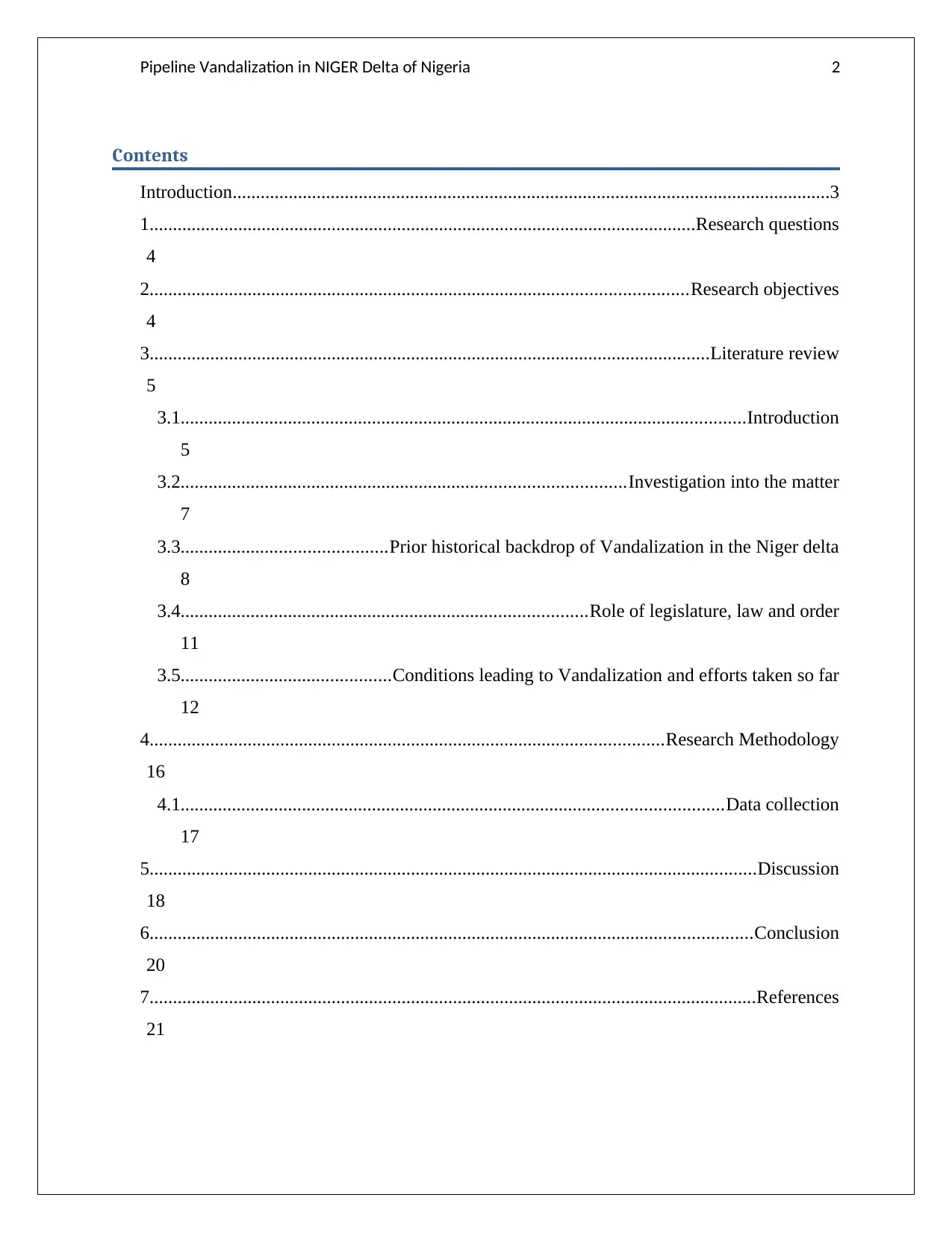
Pipeline Vandalization in NIGER Delta of Nigeria 2
Contents
Introduction................................................................................................................................3
1.....................................................................................................................Research questions
4
2...................................................................................................................Research objectives
4
3........................................................................................................................Literature review
5
3.1.........................................................................................................................Introduction
5
3.2...............................................................................................Investigation into the matter
7
3.3............................................Prior historical backdrop of Vandalization in the Niger delta
8
3.4.......................................................................................Role of legislature, law and order
11
3.5.............................................Conditions leading to Vandalization and efforts taken so far
12
4..............................................................................................................Research Methodology
16
4.1....................................................................................................................Data collection
17
5..................................................................................................................................Discussion
18
6.................................................................................................................................Conclusion
20
7..................................................................................................................................References
21
Contents
Introduction................................................................................................................................3
1.....................................................................................................................Research questions
4
2...................................................................................................................Research objectives
4
3........................................................................................................................Literature review
5
3.1.........................................................................................................................Introduction
5
3.2...............................................................................................Investigation into the matter
7
3.3............................................Prior historical backdrop of Vandalization in the Niger delta
8
3.4.......................................................................................Role of legislature, law and order
11
3.5.............................................Conditions leading to Vandalization and efforts taken so far
12
4..............................................................................................................Research Methodology
16
4.1....................................................................................................................Data collection
17
5..................................................................................................................................Discussion
18
6.................................................................................................................................Conclusion
20
7..................................................................................................................................References
21
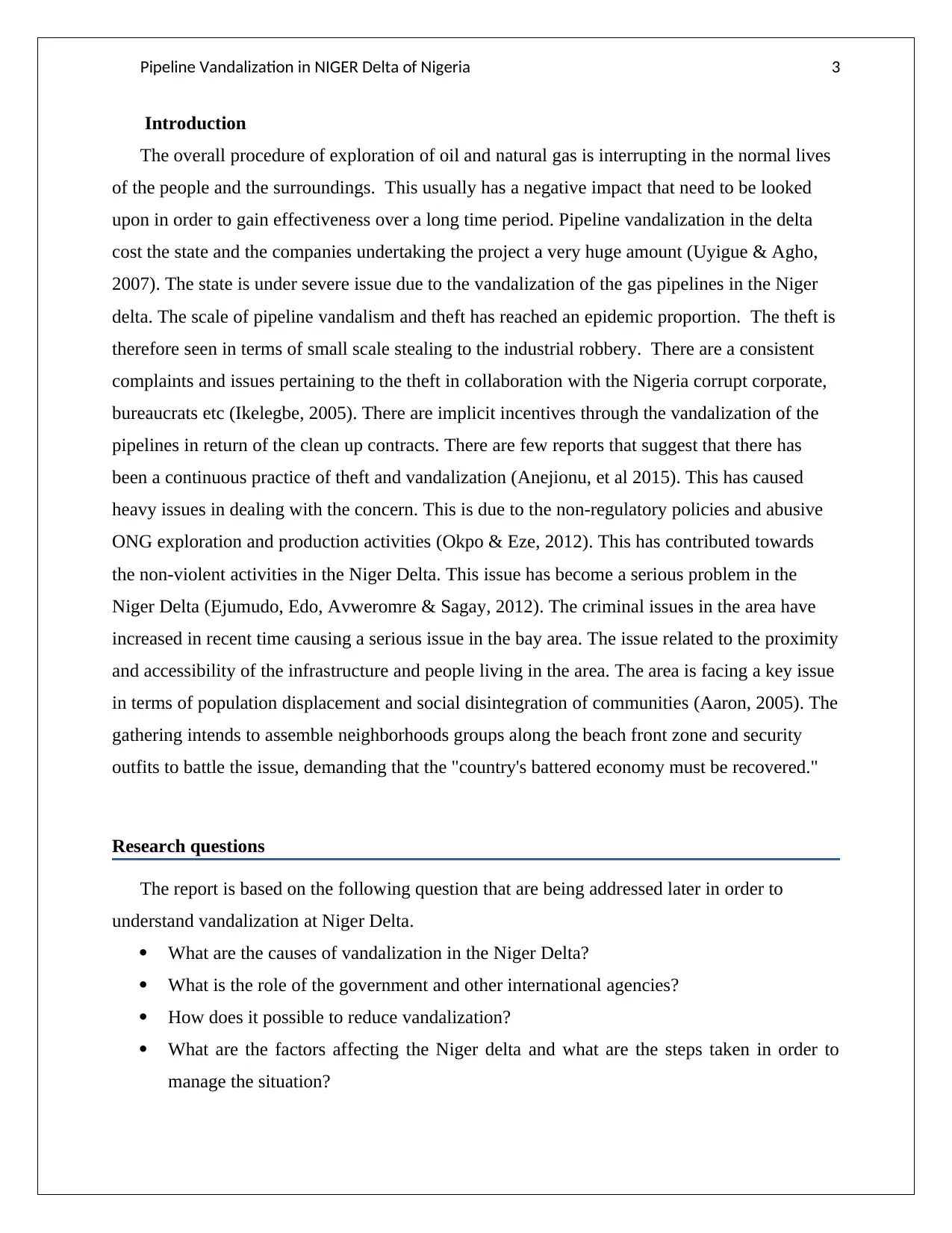
Pipeline Vandalization in NIGER Delta of Nigeria 3
Introduction
The overall procedure of exploration of oil and natural gas is interrupting in the normal lives
of the people and the surroundings. This usually has a negative impact that need to be looked
upon in order to gain effectiveness over a long time period. Pipeline vandalization in the delta
cost the state and the companies undertaking the project a very huge amount (Uyigue & Agho,
2007). The state is under severe issue due to the vandalization of the gas pipelines in the Niger
delta. The scale of pipeline vandalism and theft has reached an epidemic proportion. The theft is
therefore seen in terms of small scale stealing to the industrial robbery. There are a consistent
complaints and issues pertaining to the theft in collaboration with the Nigeria corrupt corporate,
bureaucrats etc (Ikelegbe, 2005). There are implicit incentives through the vandalization of the
pipelines in return of the clean up contracts. There are few reports that suggest that there has
been a continuous practice of theft and vandalization (Anejionu, et al 2015). This has caused
heavy issues in dealing with the concern. This is due to the non-regulatory policies and abusive
ONG exploration and production activities (Okpo & Eze, 2012). This has contributed towards
the non-violent activities in the Niger Delta. This issue has become a serious problem in the
Niger Delta (Ejumudo, Edo, Avweromre & Sagay, 2012). The criminal issues in the area have
increased in recent time causing a serious issue in the bay area. The issue related to the proximity
and accessibility of the infrastructure and people living in the area. The area is facing a key issue
in terms of population displacement and social disintegration of communities (Aaron, 2005). The
gathering intends to assemble neighborhoods groups along the beach front zone and security
outfits to battle the issue, demanding that the "country's battered economy must be recovered."
Research questions
The report is based on the following question that are being addressed later in order to
understand vandalization at Niger Delta.
What are the causes of vandalization in the Niger Delta?
What is the role of the government and other international agencies?
How does it possible to reduce vandalization?
What are the factors affecting the Niger delta and what are the steps taken in order to
manage the situation?
Introduction
The overall procedure of exploration of oil and natural gas is interrupting in the normal lives
of the people and the surroundings. This usually has a negative impact that need to be looked
upon in order to gain effectiveness over a long time period. Pipeline vandalization in the delta
cost the state and the companies undertaking the project a very huge amount (Uyigue & Agho,
2007). The state is under severe issue due to the vandalization of the gas pipelines in the Niger
delta. The scale of pipeline vandalism and theft has reached an epidemic proportion. The theft is
therefore seen in terms of small scale stealing to the industrial robbery. There are a consistent
complaints and issues pertaining to the theft in collaboration with the Nigeria corrupt corporate,
bureaucrats etc (Ikelegbe, 2005). There are implicit incentives through the vandalization of the
pipelines in return of the clean up contracts. There are few reports that suggest that there has
been a continuous practice of theft and vandalization (Anejionu, et al 2015). This has caused
heavy issues in dealing with the concern. This is due to the non-regulatory policies and abusive
ONG exploration and production activities (Okpo & Eze, 2012). This has contributed towards
the non-violent activities in the Niger Delta. This issue has become a serious problem in the
Niger Delta (Ejumudo, Edo, Avweromre & Sagay, 2012). The criminal issues in the area have
increased in recent time causing a serious issue in the bay area. The issue related to the proximity
and accessibility of the infrastructure and people living in the area. The area is facing a key issue
in terms of population displacement and social disintegration of communities (Aaron, 2005). The
gathering intends to assemble neighborhoods groups along the beach front zone and security
outfits to battle the issue, demanding that the "country's battered economy must be recovered."
Research questions
The report is based on the following question that are being addressed later in order to
understand vandalization at Niger Delta.
What are the causes of vandalization in the Niger Delta?
What is the role of the government and other international agencies?
How does it possible to reduce vandalization?
What are the factors affecting the Niger delta and what are the steps taken in order to
manage the situation?
⊘ This is a preview!⊘
Do you want full access?
Subscribe today to unlock all pages.

Trusted by 1+ million students worldwide
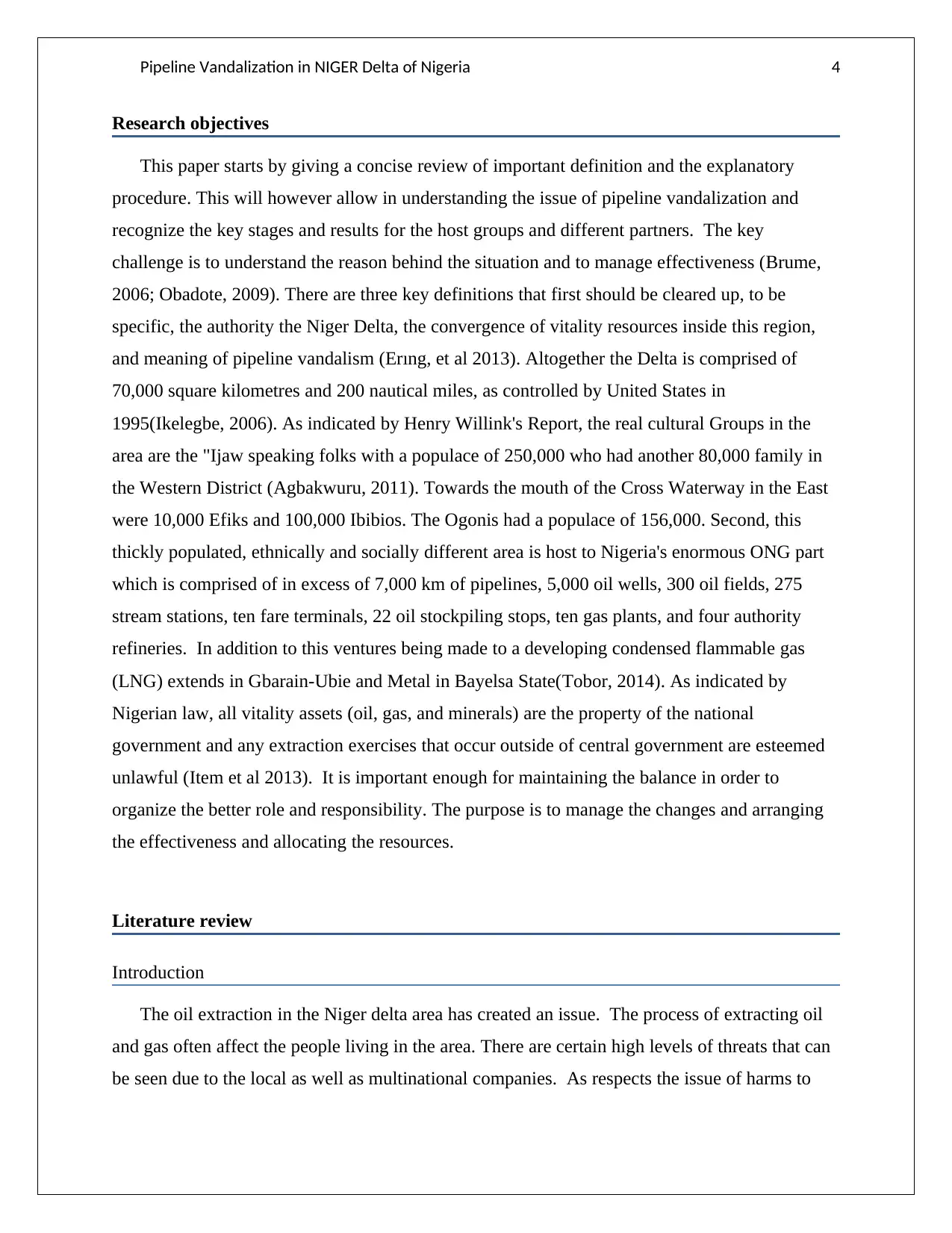
Pipeline Vandalization in NIGER Delta of Nigeria 4
Research objectives
This paper starts by giving a concise review of important definition and the explanatory
procedure. This will however allow in understanding the issue of pipeline vandalization and
recognize the key stages and results for the host groups and different partners. The key
challenge is to understand the reason behind the situation and to manage effectiveness (Brume,
2006; Obadote, 2009). There are three key definitions that first should be cleared up, to be
specific, the authority the Niger Delta, the convergence of vitality resources inside this region,
and meaning of pipeline vandalism (Erıng, et al 2013). Altogether the Delta is comprised of
70,000 square kilometres and 200 nautical miles, as controlled by United States in
1995(Ikelegbe, 2006). As indicated by Henry Willink's Report, the real cultural Groups in the
area are the "Ijaw speaking folks with a populace of 250,000 who had another 80,000 family in
the Western District (Agbakwuru, 2011). Towards the mouth of the Cross Waterway in the East
were 10,000 Efiks and 100,000 Ibibios. The Ogonis had a populace of 156,000. Second, this
thickly populated, ethnically and socially different area is host to Nigeria's enormous ONG part
which is comprised of in excess of 7,000 km of pipelines, 5,000 oil wells, 300 oil fields, 275
stream stations, ten fare terminals, 22 oil stockpiling stops, ten gas plants, and four authority
refineries. In addition to this ventures being made to a developing condensed flammable gas
(LNG) extends in Gbarain-Ubie and Metal in Bayelsa State(Tobor, 2014). As indicated by
Nigerian law, all vitality assets (oil, gas, and minerals) are the property of the national
government and any extraction exercises that occur outside of central government are esteemed
unlawful (Item et al 2013). It is important enough for maintaining the balance in order to
organize the better role and responsibility. The purpose is to manage the changes and arranging
the effectiveness and allocating the resources.
Literature review
Introduction
The oil extraction in the Niger delta area has created an issue. The process of extracting oil
and gas often affect the people living in the area. There are certain high levels of threats that can
be seen due to the local as well as multinational companies. As respects the issue of harms to
Research objectives
This paper starts by giving a concise review of important definition and the explanatory
procedure. This will however allow in understanding the issue of pipeline vandalization and
recognize the key stages and results for the host groups and different partners. The key
challenge is to understand the reason behind the situation and to manage effectiveness (Brume,
2006; Obadote, 2009). There are three key definitions that first should be cleared up, to be
specific, the authority the Niger Delta, the convergence of vitality resources inside this region,
and meaning of pipeline vandalism (Erıng, et al 2013). Altogether the Delta is comprised of
70,000 square kilometres and 200 nautical miles, as controlled by United States in
1995(Ikelegbe, 2006). As indicated by Henry Willink's Report, the real cultural Groups in the
area are the "Ijaw speaking folks with a populace of 250,000 who had another 80,000 family in
the Western District (Agbakwuru, 2011). Towards the mouth of the Cross Waterway in the East
were 10,000 Efiks and 100,000 Ibibios. The Ogonis had a populace of 156,000. Second, this
thickly populated, ethnically and socially different area is host to Nigeria's enormous ONG part
which is comprised of in excess of 7,000 km of pipelines, 5,000 oil wells, 300 oil fields, 275
stream stations, ten fare terminals, 22 oil stockpiling stops, ten gas plants, and four authority
refineries. In addition to this ventures being made to a developing condensed flammable gas
(LNG) extends in Gbarain-Ubie and Metal in Bayelsa State(Tobor, 2014). As indicated by
Nigerian law, all vitality assets (oil, gas, and minerals) are the property of the national
government and any extraction exercises that occur outside of central government are esteemed
unlawful (Item et al 2013). It is important enough for maintaining the balance in order to
organize the better role and responsibility. The purpose is to manage the changes and arranging
the effectiveness and allocating the resources.
Literature review
Introduction
The oil extraction in the Niger delta area has created an issue. The process of extracting oil
and gas often affect the people living in the area. There are certain high levels of threats that can
be seen due to the local as well as multinational companies. As respects the issue of harms to
Paraphrase This Document
Need a fresh take? Get an instant paraphrase of this document with our AI Paraphraser
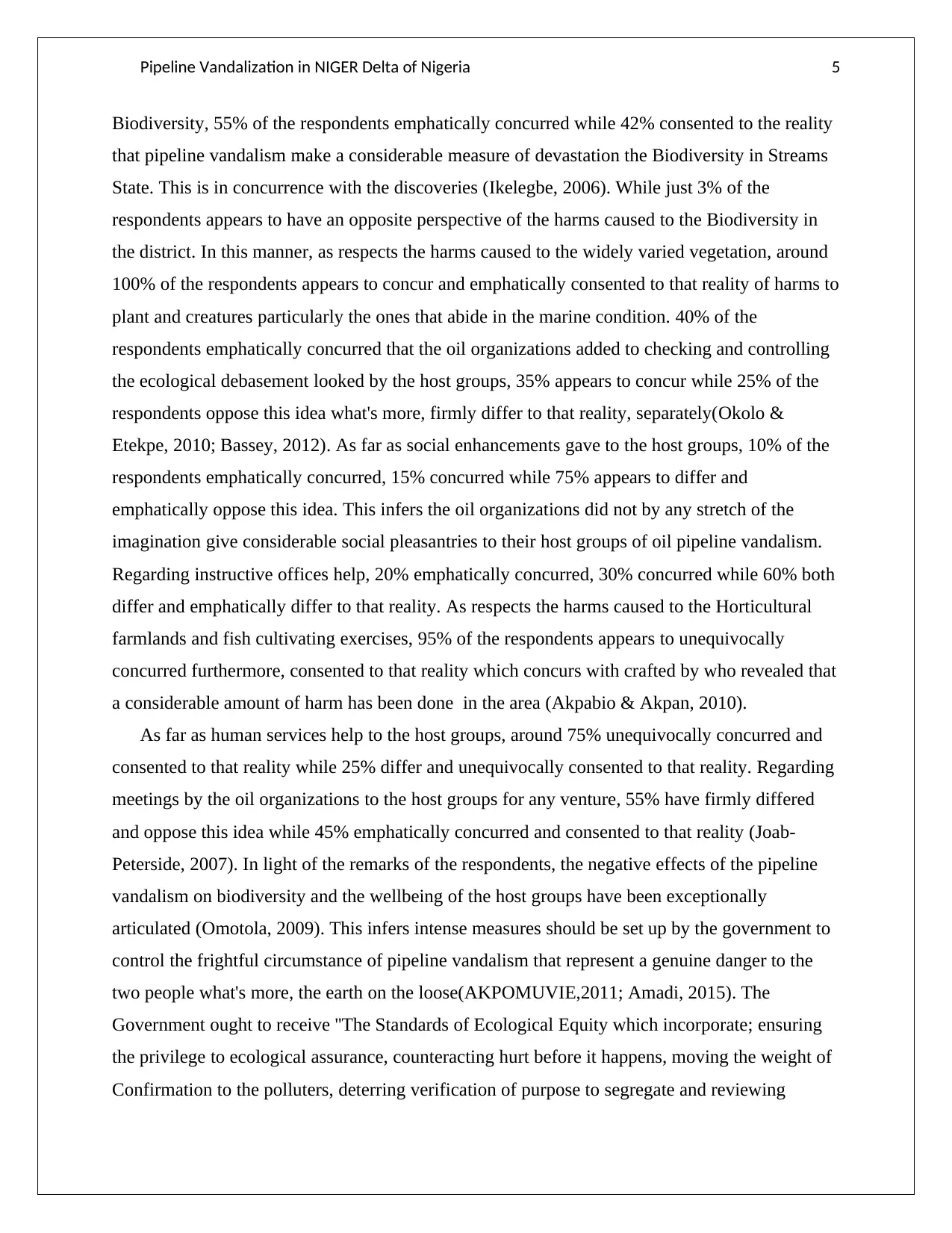
Pipeline Vandalization in NIGER Delta of Nigeria 5
Biodiversity, 55% of the respondents emphatically concurred while 42% consented to the reality
that pipeline vandalism make a considerable measure of devastation the Biodiversity in Streams
State. This is in concurrence with the discoveries (Ikelegbe, 2006). While just 3% of the
respondents appears to have an opposite perspective of the harms caused to the Biodiversity in
the district. In this manner, as respects the harms caused to the widely varied vegetation, around
100% of the respondents appears to concur and emphatically consented to that reality of harms to
plant and creatures particularly the ones that abide in the marine condition. 40% of the
respondents emphatically concurred that the oil organizations added to checking and controlling
the ecological debasement looked by the host groups, 35% appears to concur while 25% of the
respondents oppose this idea what's more, firmly differ to that reality, separately(Okolo &
Etekpe, 2010; Bassey, 2012). As far as social enhancements gave to the host groups, 10% of the
respondents emphatically concurred, 15% concurred while 75% appears to differ and
emphatically oppose this idea. This infers the oil organizations did not by any stretch of the
imagination give considerable social pleasantries to their host groups of oil pipeline vandalism.
Regarding instructive offices help, 20% emphatically concurred, 30% concurred while 60% both
differ and emphatically differ to that reality. As respects the harms caused to the Horticultural
farmlands and fish cultivating exercises, 95% of the respondents appears to unequivocally
concurred furthermore, consented to that reality which concurs with crafted by who revealed that
a considerable amount of harm has been done in the area (Akpabio & Akpan, 2010).
As far as human services help to the host groups, around 75% unequivocally concurred and
consented to that reality while 25% differ and unequivocally consented to that reality. Regarding
meetings by the oil organizations to the host groups for any venture, 55% have firmly differed
and oppose this idea while 45% emphatically concurred and consented to that reality (Joab-
Peterside, 2007). In light of the remarks of the respondents, the negative effects of the pipeline
vandalism on biodiversity and the wellbeing of the host groups have been exceptionally
articulated (Omotola, 2009). This infers intense measures should be set up by the government to
control the frightful circumstance of pipeline vandalism that represent a genuine danger to the
two people what's more, the earth on the loose(AKPOMUVIE,2011; Amadi, 2015). The
Government ought to receive ''The Standards of Ecological Equity which incorporate; ensuring
the privilege to ecological assurance, counteracting hurt before it happens, moving the weight of
Confirmation to the polluters, deterring verification of purpose to segregate and reviewing
Biodiversity, 55% of the respondents emphatically concurred while 42% consented to the reality
that pipeline vandalism make a considerable measure of devastation the Biodiversity in Streams
State. This is in concurrence with the discoveries (Ikelegbe, 2006). While just 3% of the
respondents appears to have an opposite perspective of the harms caused to the Biodiversity in
the district. In this manner, as respects the harms caused to the widely varied vegetation, around
100% of the respondents appears to concur and emphatically consented to that reality of harms to
plant and creatures particularly the ones that abide in the marine condition. 40% of the
respondents emphatically concurred that the oil organizations added to checking and controlling
the ecological debasement looked by the host groups, 35% appears to concur while 25% of the
respondents oppose this idea what's more, firmly differ to that reality, separately(Okolo &
Etekpe, 2010; Bassey, 2012). As far as social enhancements gave to the host groups, 10% of the
respondents emphatically concurred, 15% concurred while 75% appears to differ and
emphatically oppose this idea. This infers the oil organizations did not by any stretch of the
imagination give considerable social pleasantries to their host groups of oil pipeline vandalism.
Regarding instructive offices help, 20% emphatically concurred, 30% concurred while 60% both
differ and emphatically differ to that reality. As respects the harms caused to the Horticultural
farmlands and fish cultivating exercises, 95% of the respondents appears to unequivocally
concurred furthermore, consented to that reality which concurs with crafted by who revealed that
a considerable amount of harm has been done in the area (Akpabio & Akpan, 2010).
As far as human services help to the host groups, around 75% unequivocally concurred and
consented to that reality while 25% differ and unequivocally consented to that reality. Regarding
meetings by the oil organizations to the host groups for any venture, 55% have firmly differed
and oppose this idea while 45% emphatically concurred and consented to that reality (Joab-
Peterside, 2007). In light of the remarks of the respondents, the negative effects of the pipeline
vandalism on biodiversity and the wellbeing of the host groups have been exceptionally
articulated (Omotola, 2009). This infers intense measures should be set up by the government to
control the frightful circumstance of pipeline vandalism that represent a genuine danger to the
two people what's more, the earth on the loose(AKPOMUVIE,2011; Amadi, 2015). The
Government ought to receive ''The Standards of Ecological Equity which incorporate; ensuring
the privilege to ecological assurance, counteracting hurt before it happens, moving the weight of
Confirmation to the polluters, deterring verification of purpose to segregate and reviewing
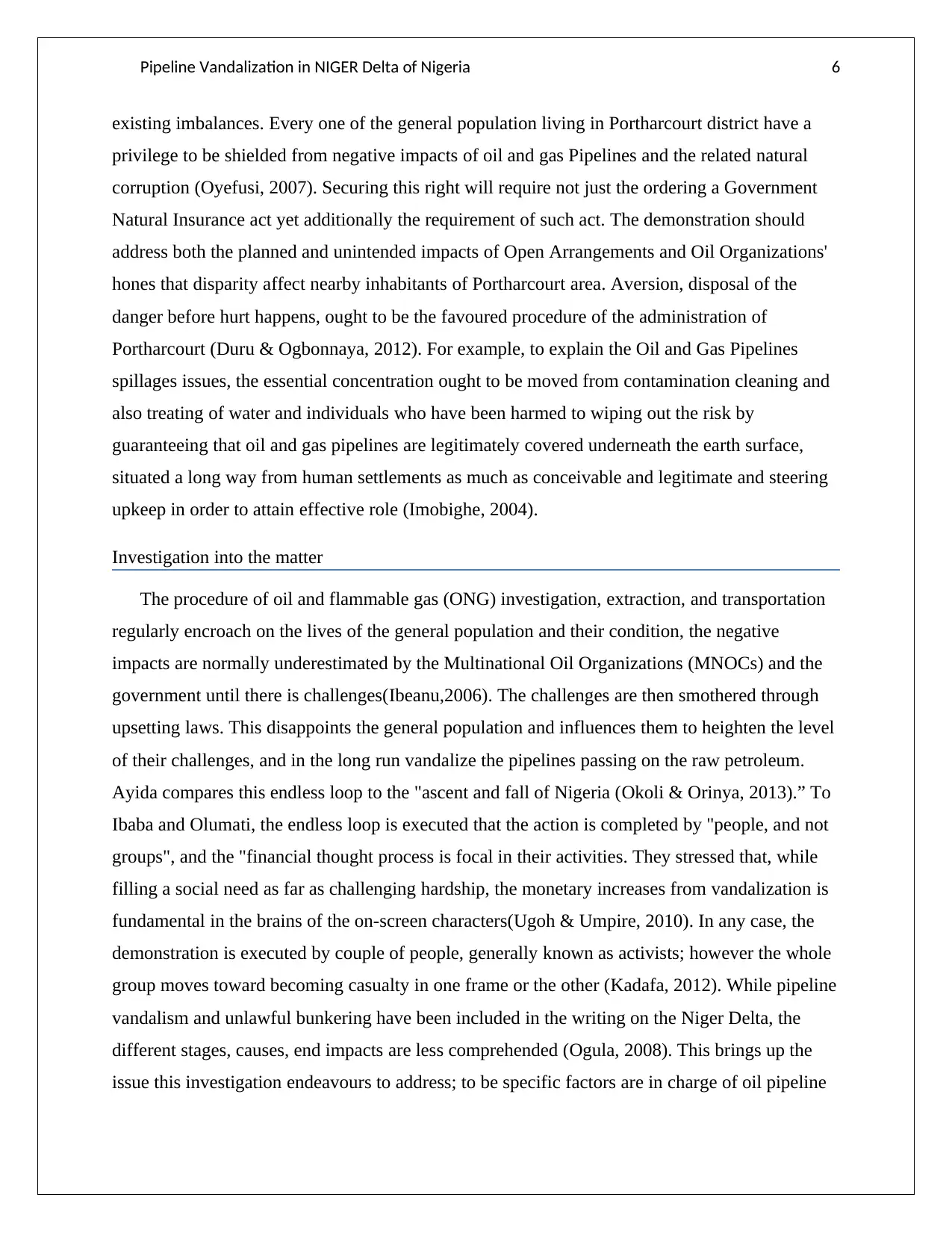
Pipeline Vandalization in NIGER Delta of Nigeria 6
existing imbalances. Every one of the general population living in Portharcourt district have a
privilege to be shielded from negative impacts of oil and gas Pipelines and the related natural
corruption (Oyefusi, 2007). Securing this right will require not just the ordering a Government
Natural Insurance act yet additionally the requirement of such act. The demonstration should
address both the planned and unintended impacts of Open Arrangements and Oil Organizations'
hones that disparity affect nearby inhabitants of Portharcourt area. Aversion, disposal of the
danger before hurt happens, ought to be the favoured procedure of the administration of
Portharcourt (Duru & Ogbonnaya, 2012). For example, to explain the Oil and Gas Pipelines
spillages issues, the essential concentration ought to be moved from contamination cleaning and
also treating of water and individuals who have been harmed to wiping out the risk by
guaranteeing that oil and gas pipelines are legitimately covered underneath the earth surface,
situated a long way from human settlements as much as conceivable and legitimate and steering
upkeep in order to attain effective role (Imobighe, 2004).
Investigation into the matter
The procedure of oil and flammable gas (ONG) investigation, extraction, and transportation
regularly encroach on the lives of the general population and their condition, the negative
impacts are normally underestimated by the Multinational Oil Organizations (MNOCs) and the
government until there is challenges(Ibeanu,2006). The challenges are then smothered through
upsetting laws. This disappoints the general population and influences them to heighten the level
of their challenges, and in the long run vandalize the pipelines passing on the raw petroleum.
Ayida compares this endless loop to the "ascent and fall of Nigeria (Okoli & Orinya, 2013).” To
Ibaba and Olumati, the endless loop is executed that the action is completed by "people, and not
groups", and the "financial thought process is focal in their activities. They stressed that, while
filling a social need as far as challenging hardship, the monetary increases from vandalization is
fundamental in the brains of the on-screen characters(Ugoh & Umpire, 2010). In any case, the
demonstration is executed by couple of people, generally known as activists; however the whole
group moves toward becoming casualty in one frame or the other (Kadafa, 2012). While pipeline
vandalism and unlawful bunkering have been included in the writing on the Niger Delta, the
different stages, causes, end impacts are less comprehended (Ogula, 2008). This brings up the
issue this investigation endeavours to address; to be specific factors are in charge of oil pipeline
existing imbalances. Every one of the general population living in Portharcourt district have a
privilege to be shielded from negative impacts of oil and gas Pipelines and the related natural
corruption (Oyefusi, 2007). Securing this right will require not just the ordering a Government
Natural Insurance act yet additionally the requirement of such act. The demonstration should
address both the planned and unintended impacts of Open Arrangements and Oil Organizations'
hones that disparity affect nearby inhabitants of Portharcourt area. Aversion, disposal of the
danger before hurt happens, ought to be the favoured procedure of the administration of
Portharcourt (Duru & Ogbonnaya, 2012). For example, to explain the Oil and Gas Pipelines
spillages issues, the essential concentration ought to be moved from contamination cleaning and
also treating of water and individuals who have been harmed to wiping out the risk by
guaranteeing that oil and gas pipelines are legitimately covered underneath the earth surface,
situated a long way from human settlements as much as conceivable and legitimate and steering
upkeep in order to attain effective role (Imobighe, 2004).
Investigation into the matter
The procedure of oil and flammable gas (ONG) investigation, extraction, and transportation
regularly encroach on the lives of the general population and their condition, the negative
impacts are normally underestimated by the Multinational Oil Organizations (MNOCs) and the
government until there is challenges(Ibeanu,2006). The challenges are then smothered through
upsetting laws. This disappoints the general population and influences them to heighten the level
of their challenges, and in the long run vandalize the pipelines passing on the raw petroleum.
Ayida compares this endless loop to the "ascent and fall of Nigeria (Okoli & Orinya, 2013).” To
Ibaba and Olumati, the endless loop is executed that the action is completed by "people, and not
groups", and the "financial thought process is focal in their activities. They stressed that, while
filling a social need as far as challenging hardship, the monetary increases from vandalization is
fundamental in the brains of the on-screen characters(Ugoh & Umpire, 2010). In any case, the
demonstration is executed by couple of people, generally known as activists; however the whole
group moves toward becoming casualty in one frame or the other (Kadafa, 2012). While pipeline
vandalism and unlawful bunkering have been included in the writing on the Niger Delta, the
different stages, causes, end impacts are less comprehended (Ogula, 2008). This brings up the
issue this investigation endeavours to address; to be specific factors are in charge of oil pipeline
⊘ This is a preview!⊘
Do you want full access?
Subscribe today to unlock all pages.

Trusted by 1+ million students worldwide
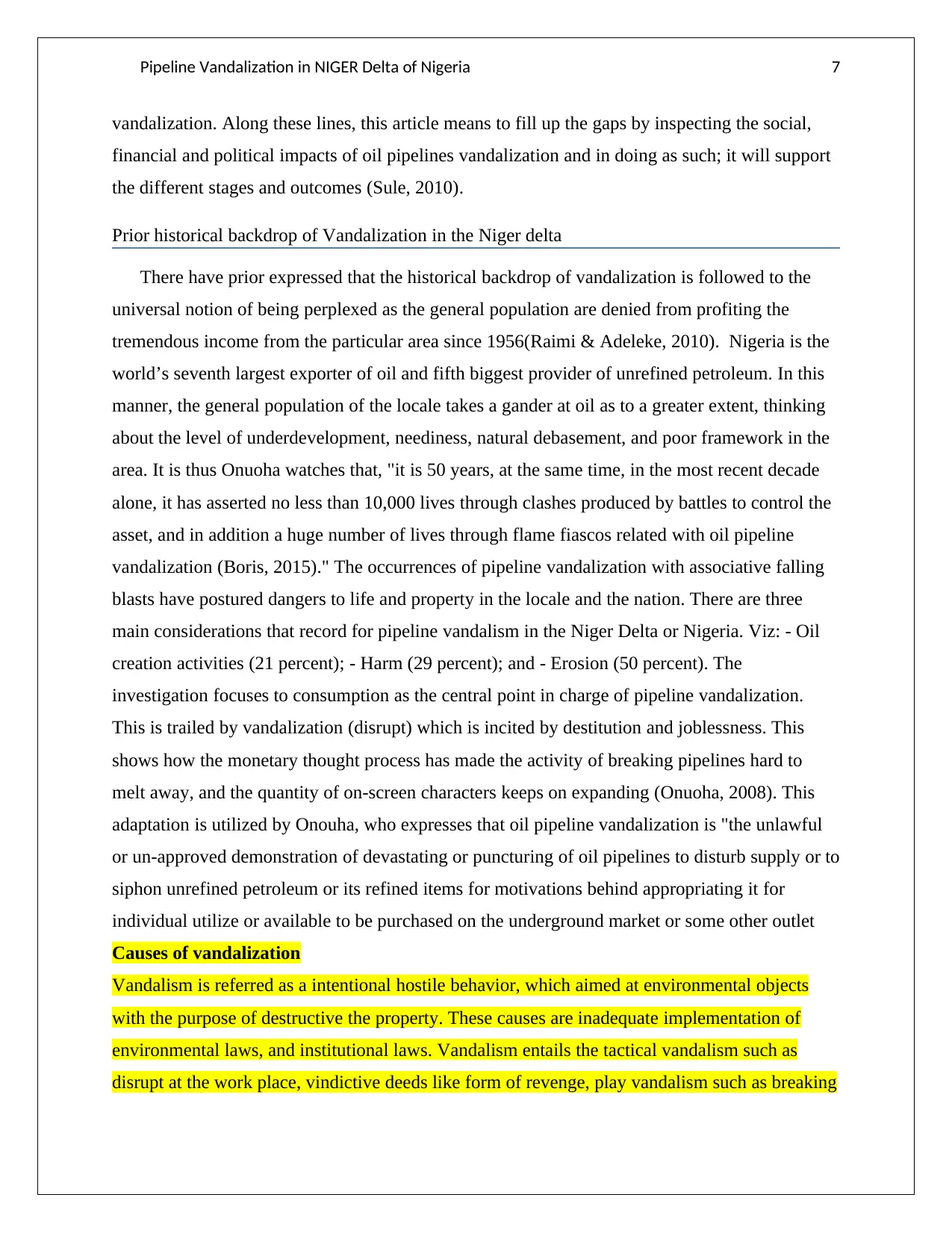
Pipeline Vandalization in NIGER Delta of Nigeria 7
vandalization. Along these lines, this article means to fill up the gaps by inspecting the social,
financial and political impacts of oil pipelines vandalization and in doing as such; it will support
the different stages and outcomes (Sule, 2010).
Prior historical backdrop of Vandalization in the Niger delta
There have prior expressed that the historical backdrop of vandalization is followed to the
universal notion of being perplexed as the general population are denied from profiting the
tremendous income from the particular area since 1956(Raimi & Adeleke, 2010). Nigeria is the
world’s seventh largest exporter of oil and fifth biggest provider of unrefined petroleum. In this
manner, the general population of the locale takes a gander at oil as to a greater extent, thinking
about the level of underdevelopment, neediness, natural debasement, and poor framework in the
area. It is thus Onuoha watches that, "it is 50 years, at the same time, in the most recent decade
alone, it has asserted no less than 10,000 lives through clashes produced by battles to control the
asset, and in addition a huge number of lives through flame fiascos related with oil pipeline
vandalization (Boris, 2015)." The occurrences of pipeline vandalization with associative falling
blasts have postured dangers to life and property in the locale and the nation. There are three
main considerations that record for pipeline vandalism in the Niger Delta or Nigeria. Viz: - Oil
creation activities (21 percent); - Harm (29 percent); and - Erosion (50 percent). The
investigation focuses to consumption as the central point in charge of pipeline vandalization.
This is trailed by vandalization (disrupt) which is incited by destitution and joblessness. This
shows how the monetary thought process has made the activity of breaking pipelines hard to
melt away, and the quantity of on-screen characters keeps on expanding (Onuoha, 2008). This
adaptation is utilized by Onouha, who expresses that oil pipeline vandalization is "the unlawful
or un-approved demonstration of devastating or puncturing of oil pipelines to disturb supply or to
siphon unrefined petroleum or its refined items for motivations behind appropriating it for
individual utilize or available to be purchased on the underground market or some other outlet
Causes of vandalization
Vandalism is referred as a intentional hostile behavior, which aimed at environmental objects
with the purpose of destructive the property. These causes are inadequate implementation of
environmental laws, and institutional laws. Vandalism entails the tactical vandalism such as
disrupt at the work place, vindictive deeds like form of revenge, play vandalism such as breaking
vandalization. Along these lines, this article means to fill up the gaps by inspecting the social,
financial and political impacts of oil pipelines vandalization and in doing as such; it will support
the different stages and outcomes (Sule, 2010).
Prior historical backdrop of Vandalization in the Niger delta
There have prior expressed that the historical backdrop of vandalization is followed to the
universal notion of being perplexed as the general population are denied from profiting the
tremendous income from the particular area since 1956(Raimi & Adeleke, 2010). Nigeria is the
world’s seventh largest exporter of oil and fifth biggest provider of unrefined petroleum. In this
manner, the general population of the locale takes a gander at oil as to a greater extent, thinking
about the level of underdevelopment, neediness, natural debasement, and poor framework in the
area. It is thus Onuoha watches that, "it is 50 years, at the same time, in the most recent decade
alone, it has asserted no less than 10,000 lives through clashes produced by battles to control the
asset, and in addition a huge number of lives through flame fiascos related with oil pipeline
vandalization (Boris, 2015)." The occurrences of pipeline vandalization with associative falling
blasts have postured dangers to life and property in the locale and the nation. There are three
main considerations that record for pipeline vandalism in the Niger Delta or Nigeria. Viz: - Oil
creation activities (21 percent); - Harm (29 percent); and - Erosion (50 percent). The
investigation focuses to consumption as the central point in charge of pipeline vandalization.
This is trailed by vandalization (disrupt) which is incited by destitution and joblessness. This
shows how the monetary thought process has made the activity of breaking pipelines hard to
melt away, and the quantity of on-screen characters keeps on expanding (Onuoha, 2008). This
adaptation is utilized by Onouha, who expresses that oil pipeline vandalization is "the unlawful
or un-approved demonstration of devastating or puncturing of oil pipelines to disturb supply or to
siphon unrefined petroleum or its refined items for motivations behind appropriating it for
individual utilize or available to be purchased on the underground market or some other outlet
Causes of vandalization
Vandalism is referred as a intentional hostile behavior, which aimed at environmental objects
with the purpose of destructive the property. These causes are inadequate implementation of
environmental laws, and institutional laws. Vandalism entails the tactical vandalism such as
disrupt at the work place, vindictive deeds like form of revenge, play vandalism such as breaking
Paraphrase This Document
Need a fresh take? Get an instant paraphrase of this document with our AI Paraphraser
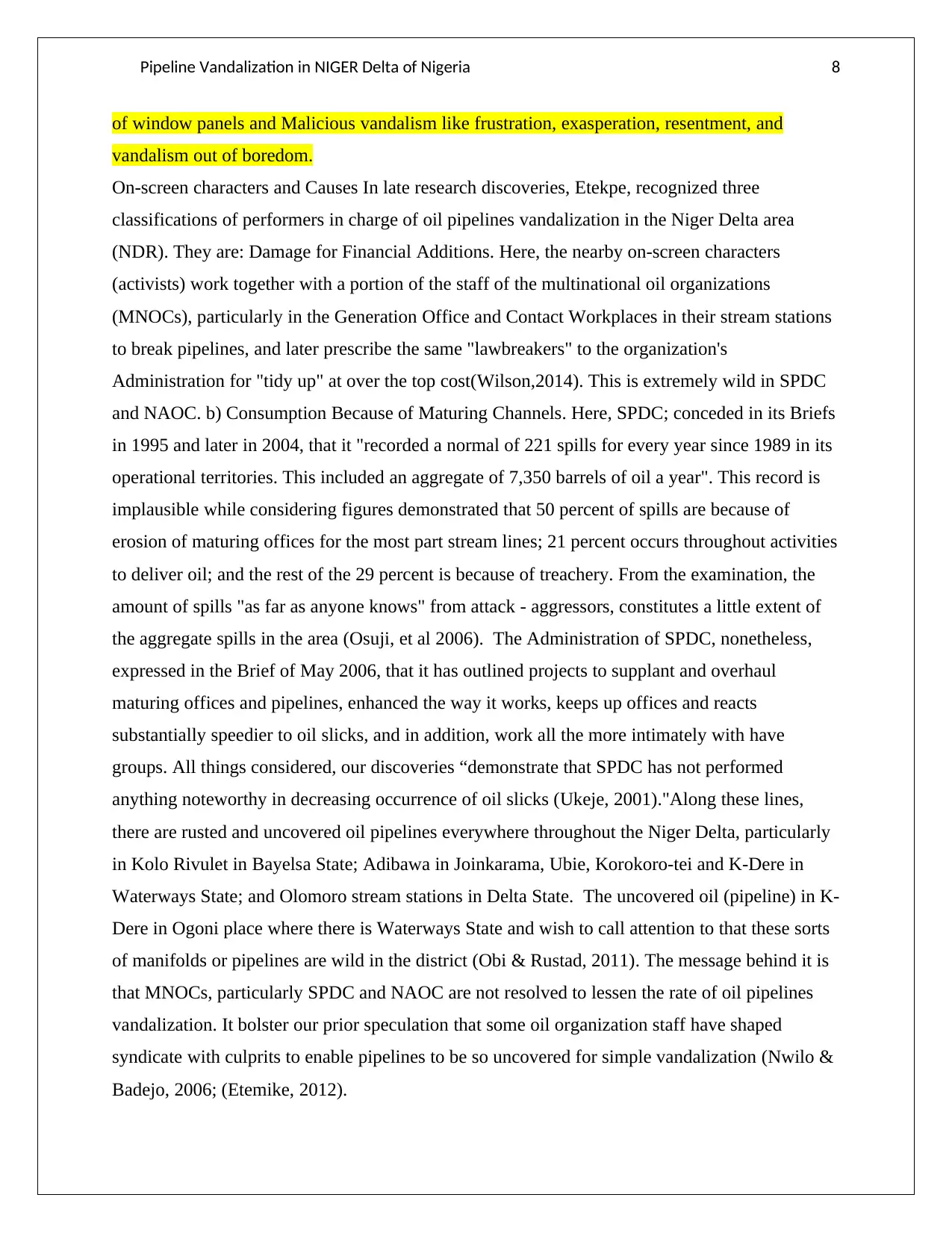
Pipeline Vandalization in NIGER Delta of Nigeria 8
of window panels and Malicious vandalism like frustration, exasperation, resentment, and
vandalism out of boredom.
On-screen characters and Causes In late research discoveries, Etekpe, recognized three
classifications of performers in charge of oil pipelines vandalization in the Niger Delta area
(NDR). They are: Damage for Financial Additions. Here, the nearby on-screen characters
(activists) work together with a portion of the staff of the multinational oil organizations
(MNOCs), particularly in the Generation Office and Contact Workplaces in their stream stations
to break pipelines, and later prescribe the same "lawbreakers" to the organization's
Administration for "tidy up" at over the top cost(Wilson,2014). This is extremely wild in SPDC
and NAOC. b) Consumption Because of Maturing Channels. Here, SPDC; conceded in its Briefs
in 1995 and later in 2004, that it "recorded a normal of 221 spills for every year since 1989 in its
operational territories. This included an aggregate of 7,350 barrels of oil a year". This record is
implausible while considering figures demonstrated that 50 percent of spills are because of
erosion of maturing offices for the most part stream lines; 21 percent occurs throughout activities
to deliver oil; and the rest of the 29 percent is because of treachery. From the examination, the
amount of spills "as far as anyone knows" from attack - aggressors, constitutes a little extent of
the aggregate spills in the area (Osuji, et al 2006). The Administration of SPDC, nonetheless,
expressed in the Brief of May 2006, that it has outlined projects to supplant and overhaul
maturing offices and pipelines, enhanced the way it works, keeps up offices and reacts
substantially speedier to oil slicks, and in addition, work all the more intimately with have
groups. All things considered, our discoveries “demonstrate that SPDC has not performed
anything noteworthy in decreasing occurrence of oil slicks (Ukeje, 2001)."Along these lines,
there are rusted and uncovered oil pipelines everywhere throughout the Niger Delta, particularly
in Kolo Rivulet in Bayelsa State; Adibawa in Joinkarama, Ubie, Korokoro-tei and K-Dere in
Waterways State; and Olomoro stream stations in Delta State. The uncovered oil (pipeline) in K-
Dere in Ogoni place where there is Waterways State and wish to call attention to that these sorts
of manifolds or pipelines are wild in the district (Obi & Rustad, 2011). The message behind it is
that MNOCs, particularly SPDC and NAOC are not resolved to lessen the rate of oil pipelines
vandalization. It bolster our prior speculation that some oil organization staff have shaped
syndicate with culprits to enable pipelines to be so uncovered for simple vandalization (Nwilo &
Badejo, 2006; (Etemike, 2012).
of window panels and Malicious vandalism like frustration, exasperation, resentment, and
vandalism out of boredom.
On-screen characters and Causes In late research discoveries, Etekpe, recognized three
classifications of performers in charge of oil pipelines vandalization in the Niger Delta area
(NDR). They are: Damage for Financial Additions. Here, the nearby on-screen characters
(activists) work together with a portion of the staff of the multinational oil organizations
(MNOCs), particularly in the Generation Office and Contact Workplaces in their stream stations
to break pipelines, and later prescribe the same "lawbreakers" to the organization's
Administration for "tidy up" at over the top cost(Wilson,2014). This is extremely wild in SPDC
and NAOC. b) Consumption Because of Maturing Channels. Here, SPDC; conceded in its Briefs
in 1995 and later in 2004, that it "recorded a normal of 221 spills for every year since 1989 in its
operational territories. This included an aggregate of 7,350 barrels of oil a year". This record is
implausible while considering figures demonstrated that 50 percent of spills are because of
erosion of maturing offices for the most part stream lines; 21 percent occurs throughout activities
to deliver oil; and the rest of the 29 percent is because of treachery. From the examination, the
amount of spills "as far as anyone knows" from attack - aggressors, constitutes a little extent of
the aggregate spills in the area (Osuji, et al 2006). The Administration of SPDC, nonetheless,
expressed in the Brief of May 2006, that it has outlined projects to supplant and overhaul
maturing offices and pipelines, enhanced the way it works, keeps up offices and reacts
substantially speedier to oil slicks, and in addition, work all the more intimately with have
groups. All things considered, our discoveries “demonstrate that SPDC has not performed
anything noteworthy in decreasing occurrence of oil slicks (Ukeje, 2001)."Along these lines,
there are rusted and uncovered oil pipelines everywhere throughout the Niger Delta, particularly
in Kolo Rivulet in Bayelsa State; Adibawa in Joinkarama, Ubie, Korokoro-tei and K-Dere in
Waterways State; and Olomoro stream stations in Delta State. The uncovered oil (pipeline) in K-
Dere in Ogoni place where there is Waterways State and wish to call attention to that these sorts
of manifolds or pipelines are wild in the district (Obi & Rustad, 2011). The message behind it is
that MNOCs, particularly SPDC and NAOC are not resolved to lessen the rate of oil pipelines
vandalization. It bolster our prior speculation that some oil organization staff have shaped
syndicate with culprits to enable pipelines to be so uncovered for simple vandalization (Nwilo &
Badejo, 2006; (Etemike, 2012).
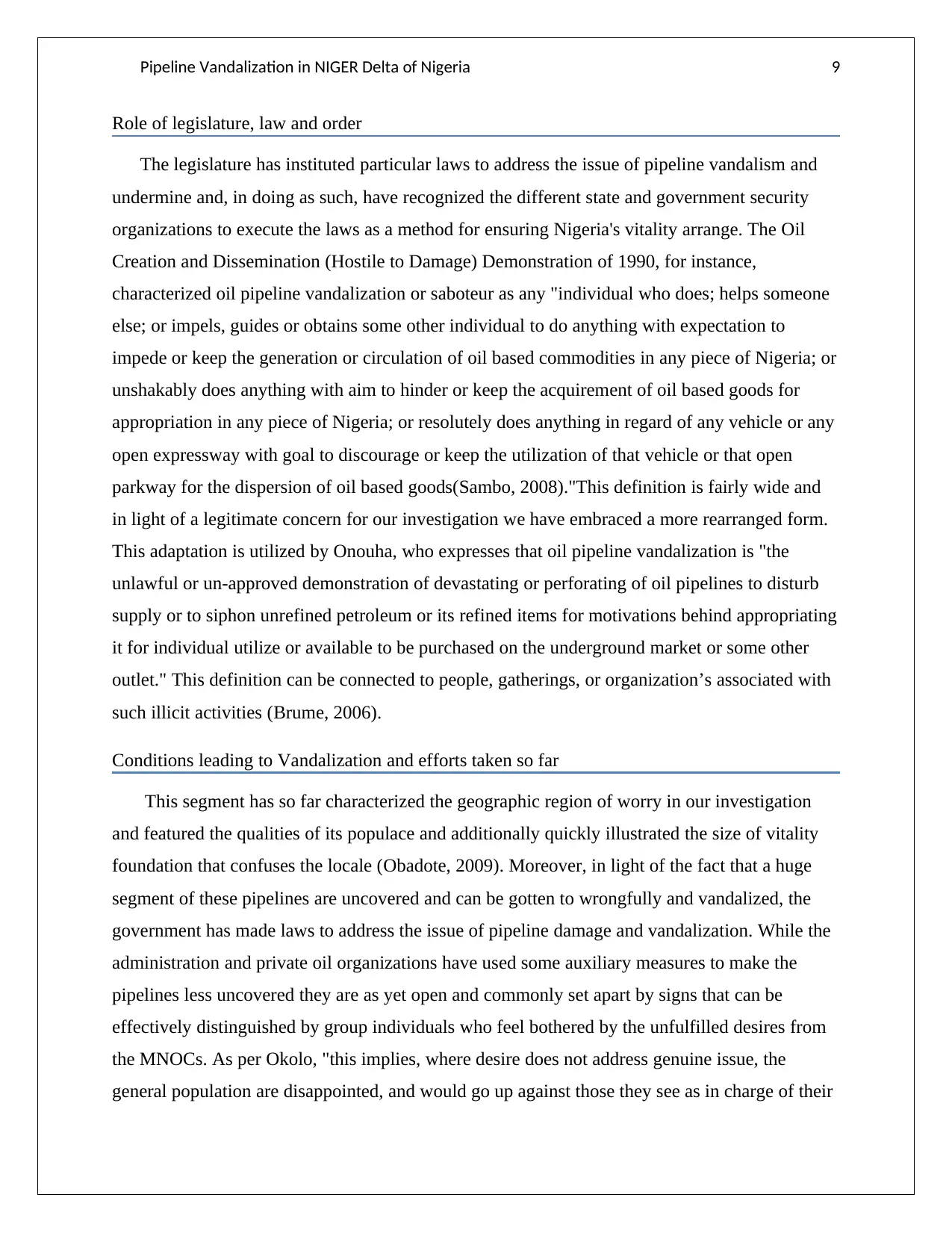
Pipeline Vandalization in NIGER Delta of Nigeria 9
Role of legislature, law and order
The legislature has instituted particular laws to address the issue of pipeline vandalism and
undermine and, in doing as such, have recognized the different state and government security
organizations to execute the laws as a method for ensuring Nigeria's vitality arrange. The Oil
Creation and Dissemination (Hostile to Damage) Demonstration of 1990, for instance,
characterized oil pipeline vandalization or saboteur as any "individual who does; helps someone
else; or impels, guides or obtains some other individual to do anything with expectation to
impede or keep the generation or circulation of oil based commodities in any piece of Nigeria; or
unshakably does anything with aim to hinder or keep the acquirement of oil based goods for
appropriation in any piece of Nigeria; or resolutely does anything in regard of any vehicle or any
open expressway with goal to discourage or keep the utilization of that vehicle or that open
parkway for the dispersion of oil based goods(Sambo, 2008)."This definition is fairly wide and
in light of a legitimate concern for our investigation we have embraced a more rearranged form.
This adaptation is utilized by Onouha, who expresses that oil pipeline vandalization is "the
unlawful or un-approved demonstration of devastating or perforating of oil pipelines to disturb
supply or to siphon unrefined petroleum or its refined items for motivations behind appropriating
it for individual utilize or available to be purchased on the underground market or some other
outlet." This definition can be connected to people, gatherings, or organization’s associated with
such illicit activities (Brume, 2006).
Conditions leading to Vandalization and efforts taken so far
This segment has so far characterized the geographic region of worry in our investigation
and featured the qualities of its populace and additionally quickly illustrated the size of vitality
foundation that confuses the locale (Obadote, 2009). Moreover, in light of the fact that a huge
segment of these pipelines are uncovered and can be gotten to wrongfully and vandalized, the
government has made laws to address the issue of pipeline damage and vandalization. While the
administration and private oil organizations have used some auxiliary measures to make the
pipelines less uncovered they are as yet open and commonly set apart by signs that can be
effectively distinguished by group individuals who feel bothered by the unfulfilled desires from
the MNOCs. As per Okolo, "this implies, where desire does not address genuine issue, the
general population are disappointed, and would go up against those they see as in charge of their
Role of legislature, law and order
The legislature has instituted particular laws to address the issue of pipeline vandalism and
undermine and, in doing as such, have recognized the different state and government security
organizations to execute the laws as a method for ensuring Nigeria's vitality arrange. The Oil
Creation and Dissemination (Hostile to Damage) Demonstration of 1990, for instance,
characterized oil pipeline vandalization or saboteur as any "individual who does; helps someone
else; or impels, guides or obtains some other individual to do anything with expectation to
impede or keep the generation or circulation of oil based commodities in any piece of Nigeria; or
unshakably does anything with aim to hinder or keep the acquirement of oil based goods for
appropriation in any piece of Nigeria; or resolutely does anything in regard of any vehicle or any
open expressway with goal to discourage or keep the utilization of that vehicle or that open
parkway for the dispersion of oil based goods(Sambo, 2008)."This definition is fairly wide and
in light of a legitimate concern for our investigation we have embraced a more rearranged form.
This adaptation is utilized by Onouha, who expresses that oil pipeline vandalization is "the
unlawful or un-approved demonstration of devastating or perforating of oil pipelines to disturb
supply or to siphon unrefined petroleum or its refined items for motivations behind appropriating
it for individual utilize or available to be purchased on the underground market or some other
outlet." This definition can be connected to people, gatherings, or organization’s associated with
such illicit activities (Brume, 2006).
Conditions leading to Vandalization and efforts taken so far
This segment has so far characterized the geographic region of worry in our investigation
and featured the qualities of its populace and additionally quickly illustrated the size of vitality
foundation that confuses the locale (Obadote, 2009). Moreover, in light of the fact that a huge
segment of these pipelines are uncovered and can be gotten to wrongfully and vandalized, the
government has made laws to address the issue of pipeline damage and vandalization. While the
administration and private oil organizations have used some auxiliary measures to make the
pipelines less uncovered they are as yet open and commonly set apart by signs that can be
effectively distinguished by group individuals who feel bothered by the unfulfilled desires from
the MNOCs. As per Okolo, "this implies, where desire does not address genuine issue, the
general population are disappointed, and would go up against those they see as in charge of their
⊘ This is a preview!⊘
Do you want full access?
Subscribe today to unlock all pages.

Trusted by 1+ million students worldwide
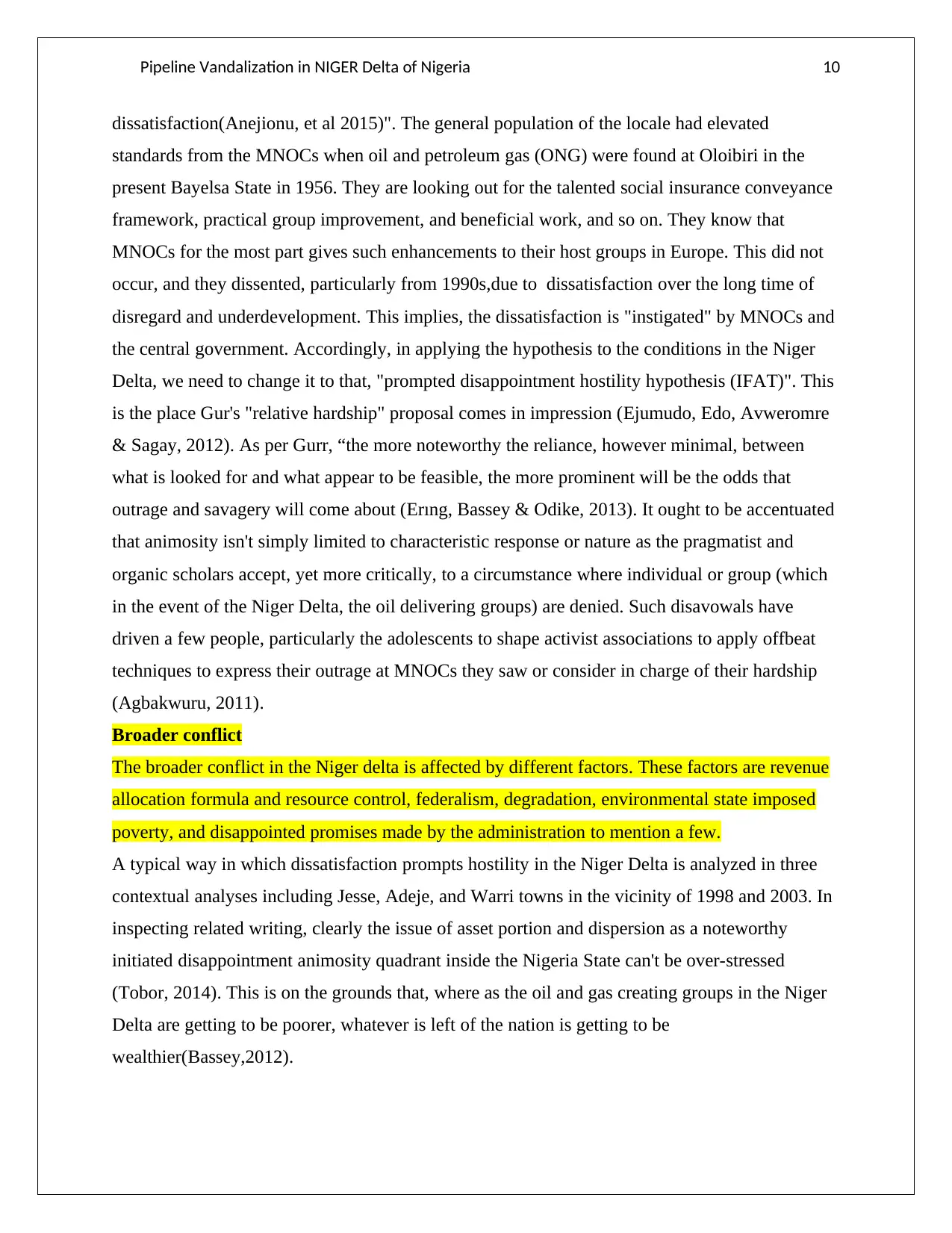
Pipeline Vandalization in NIGER Delta of Nigeria 10
dissatisfaction(Anejionu, et al 2015)". The general population of the locale had elevated
standards from the MNOCs when oil and petroleum gas (ONG) were found at Oloibiri in the
present Bayelsa State in 1956. They are looking out for the talented social insurance conveyance
framework, practical group improvement, and beneficial work, and so on. They know that
MNOCs for the most part gives such enhancements to their host groups in Europe. This did not
occur, and they dissented, particularly from 1990s,due to dissatisfaction over the long time of
disregard and underdevelopment. This implies, the dissatisfaction is "instigated" by MNOCs and
the central government. Accordingly, in applying the hypothesis to the conditions in the Niger
Delta, we need to change it to that, "prompted disappointment hostility hypothesis (IFAT)". This
is the place Gur's "relative hardship" proposal comes in impression (Ejumudo, Edo, Avweromre
& Sagay, 2012). As per Gurr, “the more noteworthy the reliance, however minimal, between
what is looked for and what appear to be feasible, the more prominent will be the odds that
outrage and savagery will come about (Erıng, Bassey & Odike, 2013). It ought to be accentuated
that animosity isn't simply limited to characteristic response or nature as the pragmatist and
organic scholars accept, yet more critically, to a circumstance where individual or group (which
in the event of the Niger Delta, the oil delivering groups) are denied. Such disavowals have
driven a few people, particularly the adolescents to shape activist associations to apply offbeat
techniques to express their outrage at MNOCs they saw or consider in charge of their hardship
(Agbakwuru, 2011).
Broader conflict
The broader conflict in the Niger delta is affected by different factors. These factors are revenue
allocation formula and resource control, federalism, degradation, environmental state imposed
poverty, and disappointed promises made by the administration to mention a few.
A typical way in which dissatisfaction prompts hostility in the Niger Delta is analyzed in three
contextual analyses including Jesse, Adeje, and Warri towns in the vicinity of 1998 and 2003. In
inspecting related writing, clearly the issue of asset portion and dispersion as a noteworthy
initiated disappointment animosity quadrant inside the Nigeria State can't be over-stressed
(Tobor, 2014). This is on the grounds that, where as the oil and gas creating groups in the Niger
Delta are getting to be poorer, whatever is left of the nation is getting to be
wealthier(Bassey,2012).
dissatisfaction(Anejionu, et al 2015)". The general population of the locale had elevated
standards from the MNOCs when oil and petroleum gas (ONG) were found at Oloibiri in the
present Bayelsa State in 1956. They are looking out for the talented social insurance conveyance
framework, practical group improvement, and beneficial work, and so on. They know that
MNOCs for the most part gives such enhancements to their host groups in Europe. This did not
occur, and they dissented, particularly from 1990s,due to dissatisfaction over the long time of
disregard and underdevelopment. This implies, the dissatisfaction is "instigated" by MNOCs and
the central government. Accordingly, in applying the hypothesis to the conditions in the Niger
Delta, we need to change it to that, "prompted disappointment hostility hypothesis (IFAT)". This
is the place Gur's "relative hardship" proposal comes in impression (Ejumudo, Edo, Avweromre
& Sagay, 2012). As per Gurr, “the more noteworthy the reliance, however minimal, between
what is looked for and what appear to be feasible, the more prominent will be the odds that
outrage and savagery will come about (Erıng, Bassey & Odike, 2013). It ought to be accentuated
that animosity isn't simply limited to characteristic response or nature as the pragmatist and
organic scholars accept, yet more critically, to a circumstance where individual or group (which
in the event of the Niger Delta, the oil delivering groups) are denied. Such disavowals have
driven a few people, particularly the adolescents to shape activist associations to apply offbeat
techniques to express their outrage at MNOCs they saw or consider in charge of their hardship
(Agbakwuru, 2011).
Broader conflict
The broader conflict in the Niger delta is affected by different factors. These factors are revenue
allocation formula and resource control, federalism, degradation, environmental state imposed
poverty, and disappointed promises made by the administration to mention a few.
A typical way in which dissatisfaction prompts hostility in the Niger Delta is analyzed in three
contextual analyses including Jesse, Adeje, and Warri towns in the vicinity of 1998 and 2003. In
inspecting related writing, clearly the issue of asset portion and dispersion as a noteworthy
initiated disappointment animosity quadrant inside the Nigeria State can't be over-stressed
(Tobor, 2014). This is on the grounds that, where as the oil and gas creating groups in the Niger
Delta are getting to be poorer, whatever is left of the nation is getting to be
wealthier(Bassey,2012).
Paraphrase This Document
Need a fresh take? Get an instant paraphrase of this document with our AI Paraphraser
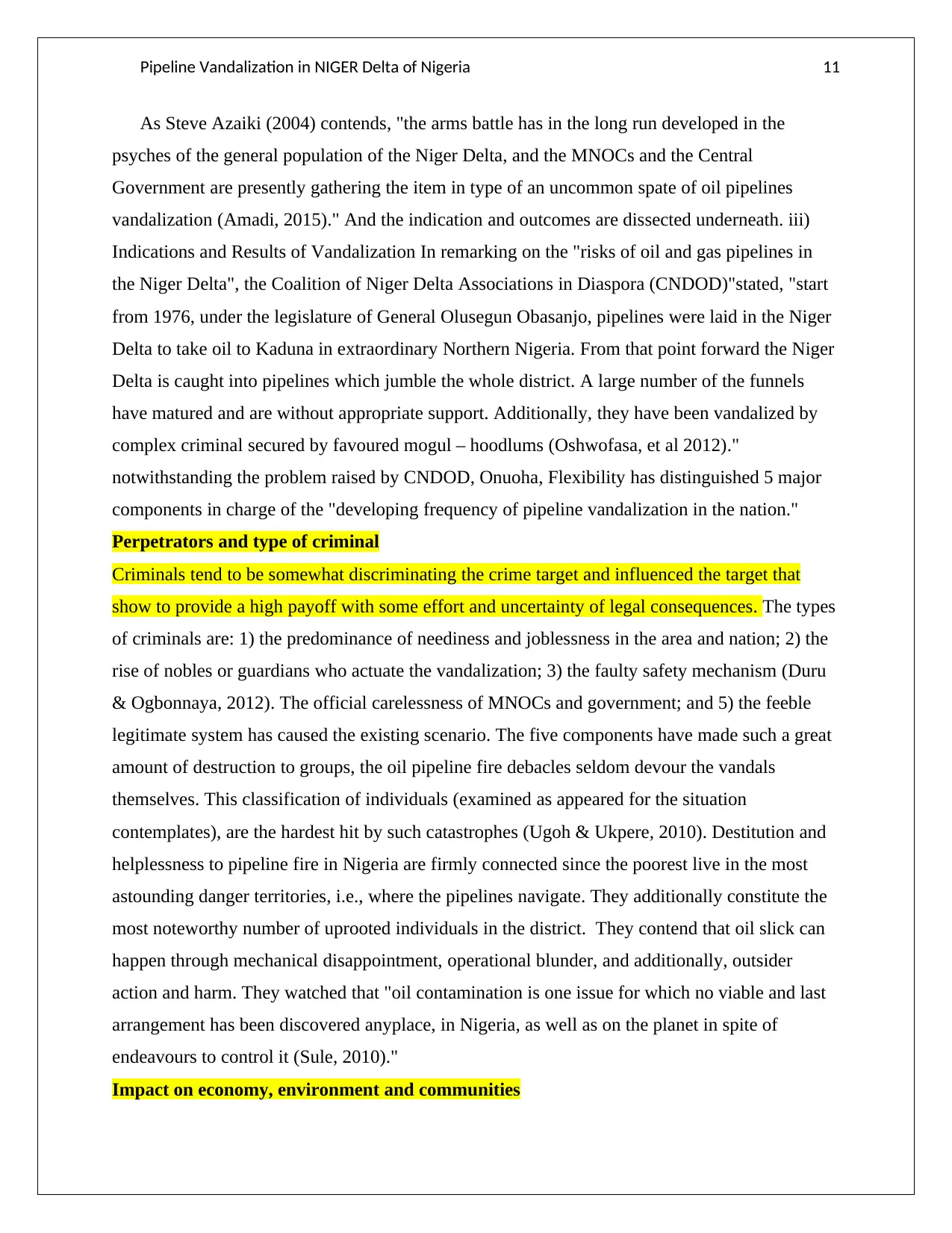
Pipeline Vandalization in NIGER Delta of Nigeria 11
As Steve Azaiki (2004) contends, "the arms battle has in the long run developed in the
psyches of the general population of the Niger Delta, and the MNOCs and the Central
Government are presently gathering the item in type of an uncommon spate of oil pipelines
vandalization (Amadi, 2015)." And the indication and outcomes are dissected underneath. iii)
Indications and Results of Vandalization In remarking on the "risks of oil and gas pipelines in
the Niger Delta", the Coalition of Niger Delta Associations in Diaspora (CNDOD)"stated, "start
from 1976, under the legislature of General Olusegun Obasanjo, pipelines were laid in the Niger
Delta to take oil to Kaduna in extraordinary Northern Nigeria. From that point forward the Niger
Delta is caught into pipelines which jumble the whole district. A large number of the funnels
have matured and are without appropriate support. Additionally, they have been vandalized by
complex criminal secured by favoured mogul – hoodlums (Oshwofasa, et al 2012)."
notwithstanding the problem raised by CNDOD, Onuoha, Flexibility has distinguished 5 major
components in charge of the "developing frequency of pipeline vandalization in the nation."
Perpetrators and type of criminal
Criminals tend to be somewhat discriminating the crime target and influenced the target that
show to provide a high payoff with some effort and uncertainty of legal consequences. The types
of criminals are: 1) the predominance of neediness and joblessness in the area and nation; 2) the
rise of nobles or guardians who actuate the vandalization; 3) the faulty safety mechanism (Duru
& Ogbonnaya, 2012). The official carelessness of MNOCs and government; and 5) the feeble
legitimate system has caused the existing scenario. The five components have made such a great
amount of destruction to groups, the oil pipeline fire debacles seldom devour the vandals
themselves. This classification of individuals (examined as appeared for the situation
contemplates), are the hardest hit by such catastrophes (Ugoh & Ukpere, 2010). Destitution and
helplessness to pipeline fire in Nigeria are firmly connected since the poorest live in the most
astounding danger territories, i.e., where the pipelines navigate. They additionally constitute the
most noteworthy number of uprooted individuals in the district. They contend that oil slick can
happen through mechanical disappointment, operational blunder, and additionally, outsider
action and harm. They watched that "oil contamination is one issue for which no viable and last
arrangement has been discovered anyplace, in Nigeria, as well as on the planet in spite of
endeavours to control it (Sule, 2010)."
Impact on economy, environment and communities
As Steve Azaiki (2004) contends, "the arms battle has in the long run developed in the
psyches of the general population of the Niger Delta, and the MNOCs and the Central
Government are presently gathering the item in type of an uncommon spate of oil pipelines
vandalization (Amadi, 2015)." And the indication and outcomes are dissected underneath. iii)
Indications and Results of Vandalization In remarking on the "risks of oil and gas pipelines in
the Niger Delta", the Coalition of Niger Delta Associations in Diaspora (CNDOD)"stated, "start
from 1976, under the legislature of General Olusegun Obasanjo, pipelines were laid in the Niger
Delta to take oil to Kaduna in extraordinary Northern Nigeria. From that point forward the Niger
Delta is caught into pipelines which jumble the whole district. A large number of the funnels
have matured and are without appropriate support. Additionally, they have been vandalized by
complex criminal secured by favoured mogul – hoodlums (Oshwofasa, et al 2012)."
notwithstanding the problem raised by CNDOD, Onuoha, Flexibility has distinguished 5 major
components in charge of the "developing frequency of pipeline vandalization in the nation."
Perpetrators and type of criminal
Criminals tend to be somewhat discriminating the crime target and influenced the target that
show to provide a high payoff with some effort and uncertainty of legal consequences. The types
of criminals are: 1) the predominance of neediness and joblessness in the area and nation; 2) the
rise of nobles or guardians who actuate the vandalization; 3) the faulty safety mechanism (Duru
& Ogbonnaya, 2012). The official carelessness of MNOCs and government; and 5) the feeble
legitimate system has caused the existing scenario. The five components have made such a great
amount of destruction to groups, the oil pipeline fire debacles seldom devour the vandals
themselves. This classification of individuals (examined as appeared for the situation
contemplates), are the hardest hit by such catastrophes (Ugoh & Ukpere, 2010). Destitution and
helplessness to pipeline fire in Nigeria are firmly connected since the poorest live in the most
astounding danger territories, i.e., where the pipelines navigate. They additionally constitute the
most noteworthy number of uprooted individuals in the district. They contend that oil slick can
happen through mechanical disappointment, operational blunder, and additionally, outsider
action and harm. They watched that "oil contamination is one issue for which no viable and last
arrangement has been discovered anyplace, in Nigeria, as well as on the planet in spite of
endeavours to control it (Sule, 2010)."
Impact on economy, environment and communities
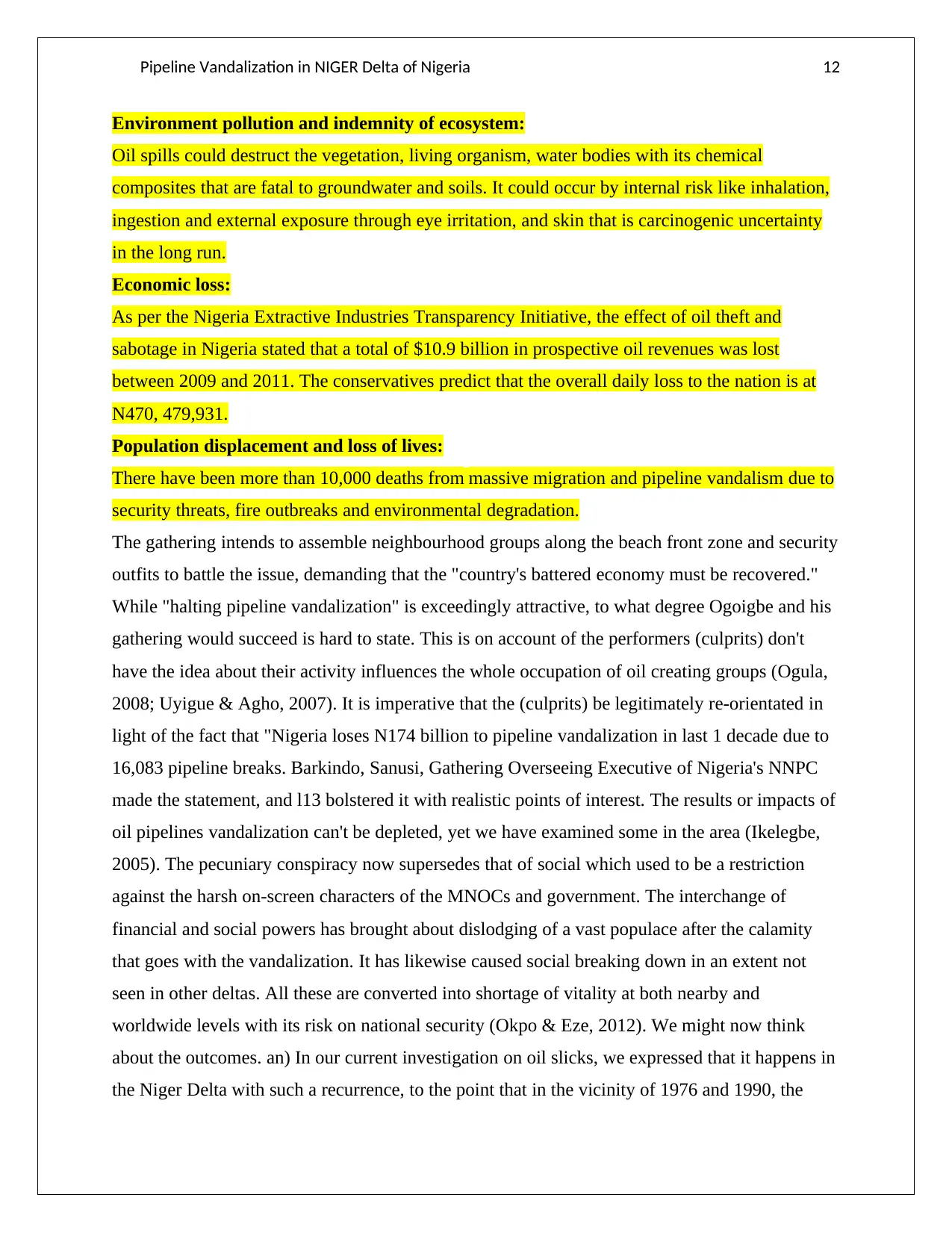
Pipeline Vandalization in NIGER Delta of Nigeria 12
Environment pollution and indemnity of ecosystem:
Oil spills could destruct the vegetation, living organism, water bodies with its chemical
composites that are fatal to groundwater and soils. It could occur by internal risk like inhalation,
ingestion and external exposure through eye irritation, and skin that is carcinogenic uncertainty
in the long run.
Economic loss:
As per the Nigeria Extractive Industries Transparency Initiative, the effect of oil theft and
sabotage in Nigeria stated that a total of $10.9 billion in prospective oil revenues was lost
between 2009 and 2011. The conservatives predict that the overall daily loss to the nation is at
N470, 479,931.
Population displacement and loss of lives:
There have been more than 10,000 deaths from massive migration and pipeline vandalism due to
security threats, fire outbreaks and environmental degradation.
The gathering intends to assemble neighbourhood groups along the beach front zone and security
outfits to battle the issue, demanding that the "country's battered economy must be recovered."
While "halting pipeline vandalization" is exceedingly attractive, to what degree Ogoigbe and his
gathering would succeed is hard to state. This is on account of the performers (culprits) don't
have the idea about their activity influences the whole occupation of oil creating groups (Ogula,
2008; Uyigue & Agho, 2007). It is imperative that the (culprits) be legitimately re-orientated in
light of the fact that "Nigeria loses N174 billion to pipeline vandalization in last 1 decade due to
16,083 pipeline breaks. Barkindo, Sanusi, Gathering Overseeing Executive of Nigeria's NNPC
made the statement, and l13 bolstered it with realistic points of interest. The results or impacts of
oil pipelines vandalization can't be depleted, yet we have examined some in the area (Ikelegbe,
2005). The pecuniary conspiracy now supersedes that of social which used to be a restriction
against the harsh on-screen characters of the MNOCs and government. The interchange of
financial and social powers has brought about dislodging of a vast populace after the calamity
that goes with the vandalization. It has likewise caused social breaking down in an extent not
seen in other deltas. All these are converted into shortage of vitality at both nearby and
worldwide levels with its risk on national security (Okpo & Eze, 2012). We might now think
about the outcomes. an) In our current investigation on oil slicks, we expressed that it happens in
the Niger Delta with such a recurrence, to the point that in the vicinity of 1976 and 1990, the
Environment pollution and indemnity of ecosystem:
Oil spills could destruct the vegetation, living organism, water bodies with its chemical
composites that are fatal to groundwater and soils. It could occur by internal risk like inhalation,
ingestion and external exposure through eye irritation, and skin that is carcinogenic uncertainty
in the long run.
Economic loss:
As per the Nigeria Extractive Industries Transparency Initiative, the effect of oil theft and
sabotage in Nigeria stated that a total of $10.9 billion in prospective oil revenues was lost
between 2009 and 2011. The conservatives predict that the overall daily loss to the nation is at
N470, 479,931.
Population displacement and loss of lives:
There have been more than 10,000 deaths from massive migration and pipeline vandalism due to
security threats, fire outbreaks and environmental degradation.
The gathering intends to assemble neighbourhood groups along the beach front zone and security
outfits to battle the issue, demanding that the "country's battered economy must be recovered."
While "halting pipeline vandalization" is exceedingly attractive, to what degree Ogoigbe and his
gathering would succeed is hard to state. This is on account of the performers (culprits) don't
have the idea about their activity influences the whole occupation of oil creating groups (Ogula,
2008; Uyigue & Agho, 2007). It is imperative that the (culprits) be legitimately re-orientated in
light of the fact that "Nigeria loses N174 billion to pipeline vandalization in last 1 decade due to
16,083 pipeline breaks. Barkindo, Sanusi, Gathering Overseeing Executive of Nigeria's NNPC
made the statement, and l13 bolstered it with realistic points of interest. The results or impacts of
oil pipelines vandalization can't be depleted, yet we have examined some in the area (Ikelegbe,
2005). The pecuniary conspiracy now supersedes that of social which used to be a restriction
against the harsh on-screen characters of the MNOCs and government. The interchange of
financial and social powers has brought about dislodging of a vast populace after the calamity
that goes with the vandalization. It has likewise caused social breaking down in an extent not
seen in other deltas. All these are converted into shortage of vitality at both nearby and
worldwide levels with its risk on national security (Okpo & Eze, 2012). We might now think
about the outcomes. an) In our current investigation on oil slicks, we expressed that it happens in
the Niger Delta with such a recurrence, to the point that in the vicinity of 1976 and 1990, the
⊘ This is a preview!⊘
Do you want full access?
Subscribe today to unlock all pages.

Trusted by 1+ million students worldwide
1 out of 21
Related Documents
Your All-in-One AI-Powered Toolkit for Academic Success.
+13062052269
info@desklib.com
Available 24*7 on WhatsApp / Email
![[object Object]](/_next/static/media/star-bottom.7253800d.svg)
Unlock your academic potential
Copyright © 2020–2026 A2Z Services. All Rights Reserved. Developed and managed by ZUCOL.





